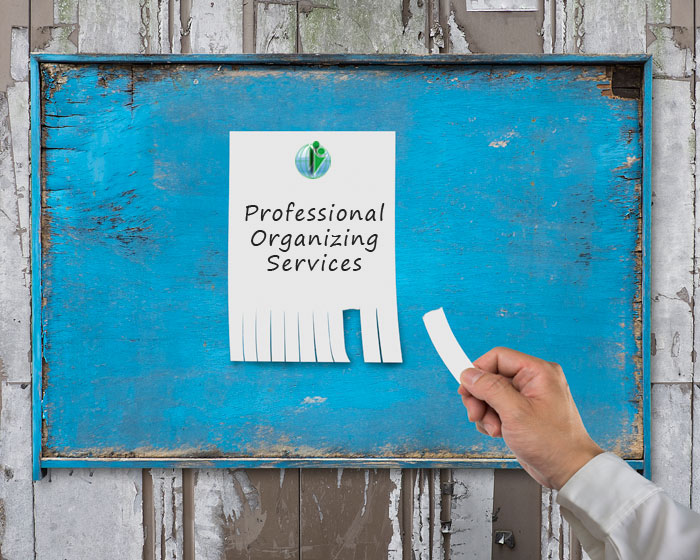How to Build Credibility for Your Professional Organizing Company
This page may contain links to Amazon.com or other sites from which I may receive commission on purchases you make after clicking on such links. Read my full Disclosure Policy

Although the organizing industry began nearly forty years ago, it took many years for the profession to become widely known. Now there are thousands of professional organizers throughout the world, and most people probably have at least a basic understanding of what you do. But finding a way to stand out from all the others who offer similar services can be quite a challenge!
Aaron Traub has had considerable success in this area, and he’s here to share several ways you can establish credibility and give potential clients the confidence they need to consider you for their organizing needs.

Professional organizers lay the foundation for efficiency. The work that you do can mean the difference between stress and anxiety-filled home environment and a living space that’s comfortable, peaceful, and easy to enjoy. The trick is learning to prove to your market that your efforts are worth the investment.
Given the nature of the professional organizing industry, establishing credibility can be just as challenging as wading through years of collected clutter and establishing a feasible plan for bringing order. However, with the following tips, you can quickly build a solid reputation for effectiveness, value, and expertise.
Display Accreditations and Awards
Taking advantage of the resources and opportunities provided by the National Association of Productivity & Organizing (NAPO) is a great way to build your credibility within the professional organizing industry. NAPO offers certification courses, opportunities for ongoing learning, research tools, and more. They also have an annual summit, several special interest groups, and opportunities to become a business partner.
This organization also awards distinguished and high-performing businesses at its annual gatherings. These are honors that can be listed on your professional website, social media profiles, and physical marketing materials. Becoming a member of NAPO helps legitimize companies in this field.
Generating Glowing, 5-Star Customer Reviews
Positive reviews are consistently ranked among the most effective ways to attract new customers. Online review statistics for 2022 show that 93 percent of consumers read customer reviews, and 93 percent report this feedback influencing their purchasing decisions.
Sadly, providing superior workmanship and outstanding results isn’t always enough to get your clients to leave reviews. More often than not, even satisfied buyers need a little nudge.
You have to be proactive in building your online reputation and dogged in requesting the necessary feedback. According to Forbes, social proof builds confidence. Moreover, one of the surest ways to get social proof is by giving your customers a reason to provide it.
Although incentivizing reviews can leave companies in a dubious, gray area of violating basic business ethics and online guidelines, you can avoid this by offering non-monetary incentives or incentives that benefit third parties. For instance, you can:
- Make a small donation to a charitable organization for each review that’s left
- Plant a tree to support the natural environment
- Hand out a free promotional item
Another way to encourage reviews is by making it easy for people to leave them. Send out links to your preferred review platforms by text or email. Include these links on your invoices, physical and digital receipts, brochures, and other printed materials.
More importantly, don’t try to collect more information than is necessary when requesting reviews. For instance, if you have an in-depth survey that you want your existing customers to complete, don’t try to attach this to the review process or your review requests. Busy consumers are more likely to complete this task if they can get it done within just a few minutes.
All things said, even if you don’t have a formal process for encouraging reviews, simply asking for one after providing superior service is a great place to start.
Punctuality: The Importance of Being on Time
Nothing says professional like being on time. Being late has a tremendous impact on your reputation as a professional organizer, even if you believe you have a worthwhile and perfectly understandable excuse.
Not only do professional organizers create environments that promote productivity and efficiency, but they also resolve common time management problems. If you present yourself as struggling in this area, no one will find your claims of being able to help them improve their time management as being credible.
Let Company-Branded Clothing do the Talking
Incorporating uniforms or professional, company-branded clothing into your business model will set you apart from every other person or company in your industry that has overlooked this critical detail.
Uniforms and branded clothing project competence and inspire confidence. Using company-branded clothing also gives consumers a greater sense of security. They know who they’re letting into their homes. Switching to branded clothing also:
- It eliminates the need for a company dress code
- Ensures brand consistency no matter how large your team grows
- Places the reputation of your company behind every employee
Company uniforms and other options in company-branded clothing also provide ongoing marketing opportunities. Everyone who encounters your branded hats, shirts, or other items will be exposed to your business and its values. Branded clothing is additionally great for keeping your business fresh in the minds of local consumers who’ve used your services in the past.
Don’t Overpromise and Underdeliver
One of the best ways to generate glowing, 5-star reviews and build overall credibility for your company is by consistently providing good value. This may sometimes mean staying later than planned to get the job done or going above and beyond in other ways.
One significant part of delivering on what was sold is helping your customers develop feasible expectations. As you define your services, ensure that your customers know exactly what they’re getting. If you mistake under-explaining what you offer, your customers may expect more than you’re reasonably able to deliver or more than you’re willing to provide at a specific cost.
Establishing service packages, standalone services, and transparent pricing will make all the difference. It will also ensure that you’re never accused of false advertising and that you’re never working at excessive levels for fees that won’t keep your business afloat.
Use High-Quality Company Project and Team Photos
Impressive portfolios of projects that you’ve completed in the past are also great tools for building your credibility as a professional organizer. Talk with your high-profile clients about the prospect of sharing before-and-after images, case studies, or other digital assets that will help you build your brand.
Although some clients may wish to retain their anonymity, others will be more than willing to share their stories. This is especially true if you incentivize them to do so by offering discounts on their current or future service needs.
Team photos give professional organizing companies a face. They make them both more personal and more personable. Create a space on your website dedicated to showcasing your team’s talents. List the titles and duties of your employees along with either a group photo or individual photos.
Conclusion
Establishing your professional organization company as a credible one is a multi-pronged effort. Although five-star reviews are essential to this process, consistently delivering good value is also vital.
With clearly defined services, digital assets that showcase your best work, and a professional, branded look for your employees, you can make your company a standout choice in every market condition.




Great tips here! In our industry, I think having a recommendation from a happy client is worth so much. Definitely we need to be on time, LOL! If we can’t be on time, we are in the wrong profession.
So true!
I’m totally on board with NAPO education. It’s been the best money I spend to educate my team. It’s cost-effective, meaning I don’t have to take time to train and educate and my employees take a lesson when they have time.
We also prescribe to a company uniform for two reasons. You don’t have to wear and wear out your own clothing and it also makes us look more professional.
Finally, Google reviews are the life blood of our business. Once we figured out the importance of them we began asking each client for a review. It’s such a boost when someone posts a glowing review!
Great ideas!
Thanks for your comment, Janet. It’s always good to have confirmation from a seasoned pro like yourself!
I love your suggestions on incentives to get reviews. I will have to try them.
Making my questionnaire short, with no more than 5 questions, helped my clients answer them quickly and easily. Asking for a 1-5 star survey response helps them promptly reply. One open-ended response to a question is plenty for my clients.
Agreed! I find when completing surveys, if there are too many questions, or too many options to choose from, I’m far less likely to give meaningful answers, than one open-ended question.
I loved this advice. I often forget to ask for reviews from clients. Recently a prospective client asked for references. I had no problem giving the person names and phones numbers to call but it would have been even better to have reviews posted on my website. I also agree that certifications speak to an organizers credibility.
I bet most clients would prefer to give a written review one time than to answer questions from a bunch of random strangers!
Excellent advice, Aaron! I’m doing better with some than others. Some I avoid on principle, others out of personal “grrrr, argh” so I need to examine my processes.
My marketing always includes my BCPO and Evernote certifications and my NAPO membership; I make punctuality a point in everything I do from the first consultation onward; and I try to always exceed expectations.
On the other hand, I tend to think of branded clothing as denoting a labor-related physical service, and (as noted in the post) more for teams. Conversely, I consider myself to be akin to a coach or therapist. (I do provide physical organizing, but I consider that value-added, not the point of what I do, which is more intellectual/emotional, with a side of motivation and sorting/lifting.) So, if my therapist, lawyer, or accountant wore branded clothing for sessions, or going to court, or meeting with the IRS, I’d find it odd. (I think it makes sense for organizers who mainly provide a physical service, but it’s not for me.) I do have a branded nametag/pin for when I’m doing speaking engagements. Similarly, I don’t do photos. Yes, it would improve my marketing, but I feel like it’s a pressure clients don’t need, like those before-and-after diet photos. I get the value of photos, but it seems like such an invasion, at least for sensitive clients. (Plus, it’s really hard to capture before-and-after shots of time management and removal of mental and schedule clutter!)
The biggest area where I can improve is asking clients for reviews. I despise being asked to leave reviews, so I hate the idea of making my clients feel that way. Even after twenty years, this is a constant back-and-forth struggle for me. When I am the customer, I feel like, “I paid you, isn’t that enough?!” but of course, not everyone feels that way. Sigh. I’ll work on that!
Julie, I appreciate that you commented on several of Aaron’s suggestions, including your own reasons for not doing some of them. Every organizing business is unique and there’s really no one-size-fits-all solution, is there?
Kathi Burns made similar comments about branded clothing in Answers to the Perennial Question “What Should I Wear?” in an Interview with Image Consultant Kathi Burns, though yours are much more amusing. 🙂
I don’t mind writing reviews, as long as the company asks for them at an appropriate time – not the day I receive the product (before I’ve had a chance to use it), but not several months later either (especially if it’s something consumable like garden soil – yes, Home Depot, I’m talking to you). It’s a bit different for services of course, but if you want powerful reviews, you probably want to give it enough time for clients to be able to articulate the positive changes they’ve received from working with you, but not so long that they don’t remember the experience.